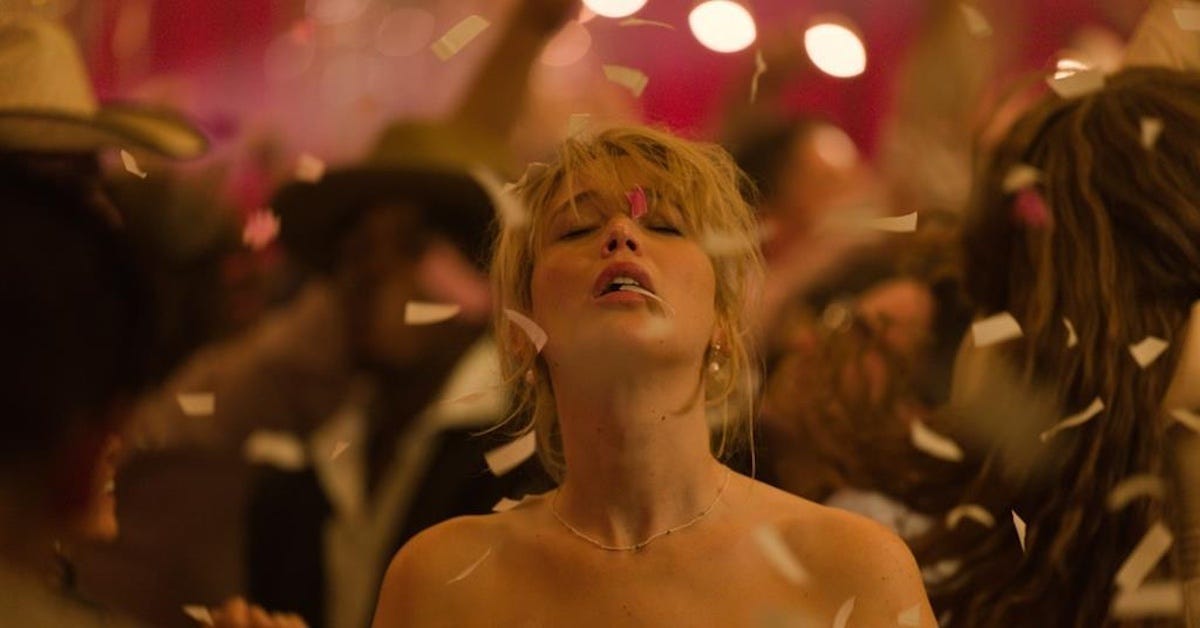LFF 2025: Die, My Love
Ramsay tackles depression and the result is disturbingly good
Festival Review: Die, My Love (dir. Lynne Ramsay)
Plot in a nutshell
Grace (Jennifer Lawrence) and Jackson (Robert Pattinson) are a young couple expecting a child. When they move to Jackson’s family home after his dad passes and their son is born, Grace starts to exhibit all the telltale signs of postpartum depression. Both Grace and Jackson have to learn how to navigate through this increasingly challenging phase of their relationship.
It’s been too long since Lynne Ramsay’s You Were Never Really Here (2017), one of the best films of the 2010s. She finally returns with an adaptation of a little-known Argentinian novella called Die, My Love, and the result is another typically harrowing Ramsayian experience. Jennifer Lawrence and Robert Pattinson follow in the footsteps of previous actors (Joaquin Phoenix, Tilda Swinton, Samantha Morton..) who’ve had the honor of working with the great director, and deliver some of the best work of their careers. Lawrence is especially liberated, candid and caustic; she plays the ironically-named Grace like a free spirit possessed by the Devil.
This is as disturbing, naked and unrelenting a depiction of depression we have gotten since Kenneth Lonergan’s Manchester by the Sea (2016). Ramsay’s direction and Lawrence’s performance are just as committed as Lonergan’s and Casey Affleck’s were, but there are two key differences in Die, My Love. The affliction is more externalized, and it’s distinctly female in nature.
Postpartum depression is such a particularly feminine experience that it’s most authentic lens is the female gaze, and us men can empathize and appreciate all we want; but truly understanding it feels impossible (and presumptuous). Grace externalizes her state of mind — crawling on the floor like an animal, barking back at the dog, running around a field with a knife, jumping through a glass door, etc. — but she has a very hard time communicating her feelings. She’d rather jump out of a moving car, literally.
As such, as a man, it’s hard to penetrate that wall of feelings. Not even Jackson’s mother, Pam (the wonderful Sissy Spacek), can reach her. In fact, Grace’s most kindred spirit in the movie, other than wounded animals, is Jackson’s dad Harry (Nick Nolte in a rare role that’s tiny and devastating) but she seems to connect to his dementia more than him as a person.
As elusive and volatile as Grace’s melancholia is, there are clear and obvious clues that Jackson misses. He is as flawed as he is good natured, and his inability to read the room has a direct effect on Grace. Pattinson and Lawrence conjure up a dark chemistry in a house that morphs from home to prison, feeding off of each other like ravenous wild beasts. She’s often the one who ends up chewing him up, along with the scenery.
Die, My Love, as its emotionally paradoxical title suggests, is a tough one to get through. Every laugh it coaxes, and there are many, is mired in discomfort. It’s the second best horror film about motherhood of the year, after If I Had Legs I’d Kick You, but the first in terms of visualizing the gradual psychological breakdown of a woman in crisis. Best represented in a scene which will stay with me forever:
Grace, an aspiring writer who hasn’t been able to put a single word to paper since giving birth and having just come back from feeding her baby, stands over a blank sheet, spraying black ink blots across it. Milk drips from her exposed breast and mingles with the ink, the mixture transitioning into a starry sky that Jackson is looking at through his telescope. Pure cinema.



Znaci - strasno, Niki!!! Svasta ces ti da prozivis gledajuci filmove!